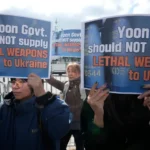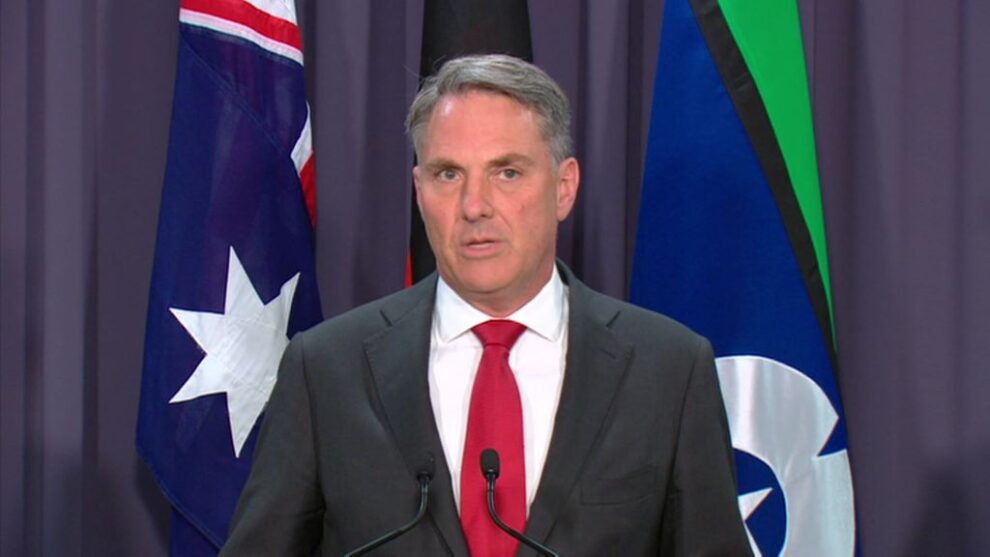As Defence Minister, Richard Marles is uninspiring. He’s not across his brief. His recent statement saying Australia will not be taking US or UK nuclear waste under the AUKUS program is plainly wrong and contradicted by his own Department. Rex Patrick reports.
From 2027, Australia will start receiving low-level radioactive waste from the operation of American and British nuclear-powered submarines rotating through HMAS Stirling base in Western Australia. This is an indisputable fact outlined in fresh documents extracted from Defence using FOI.
And even though the Albanese Government has made it clear it has no appetite to take high-level radioactive waste from decommissioning US and UK subs, the legislation that has been tabled in the Parliament to regulate AUKUS nuclear waste would not prevent a future government from changing this with a simple policy shift.
One might suggest the chances of a future Australian government agreeing to accept high level nuclear waste from US or UK submarines is about a plausible as the idea Australia might let a foreign power test nuclear weapons on our shores. History shows all sorts of things are possible when the law allows.
Welded shut
Under the AUKUS agreement, the US and UK intend to provide Australia with submarine nuclear reactors as welded nuclear power units that will not require refuelling during their lifetime.
The Australian Government has gone to painstaking levels to explain to the International Atomic Energy Agency, the international body charged with monitoring nuclear weapon non-proliferation, that removing nuclear material from these reactors is highly complex – requiring specialist equipment, facilities and workforce – and doing so would render the power unit, and the submarines, inoperable.
The Government also points out the highly enriched fuel that will be used in Royal Australian Navy subs cannot be used in nuclear weapons without further chemical processing, which would require facilities that Australia does not have and will not seek to establish.
But sealed nuclear reactors do place a waste burden on the operators, in that the sustainment of them generates low level waste and the need to ultimately dispose of the spent fuel at the end of the reactor’s life.
Taking US and UK low-level nuclear waste
Day to day operation and sustainment of a nuclear reactor creates radioactive waste in the form of disposable gloves, wipes, reactor coolant and used tools and Personal Protective Equipment.
The amount of low-level waste produced by a submarine is about the size of a small skip each year. Australia will have to take care of the low-level waste generated over the life of the AUKUS submarines.
But in documents released under FOI laws, the Defence Department has confirmed that Australia will also take low-level nuclear waste from US and UK submarines.
We are Taking US and UK Waste (Source: Defence)
Senator David Shoebridge, who has been following AUKUS closely, called for transparency. “Why won’t the Albanese government come clean on this and say clearly and loudly that AUKUS means we take on this additional nuclear waste stream?”
Defence backflip
Australia hasn’t managed, in all of 50 years, to set up a nuclear waste management facility to take care of our own low level nuclear waste. It’s scattered all over the country.
“Australia has spent decades failing to solve our own low-level nuclear waste storage; now we have Labor volunteering to take on US and UK waste to add to the mess,” said Shoebridge
Part of the reason we don’t have a site for a low-level national radioactive waste management facility is because Defence has insisted in the past that there is no room in any of the vast Defence Estate for a facility to store the waste, and that the presence of such as facility would be inconsistent with their operations.
Yet, now they need a solution, a spot has been found.
From the first quarter of 2027, US submarines will start rotating through HMAS Stirling, south of Perth. Over time, the number of US submarines will increase to four.
As part of preparations, the Government has allocated $1.5 billion for nuclear sub-operational berths on existing wharfs, emergency preparation and response capabilities, intermediate maintenance facilities and “licensed facilities for radiological controlled activities (including operational waste management facility).
How Richard Marles doesn’t know this is beyond belief.
High-level nuclear waste disposal
When a submarine is decommissioned, about a “small hatch-back” of spent fuel needs to be disposed of. A further “four-wheel drive” of reactor components needs to be taken care of. This needs to be stored in a special facility set up to take the waste and store it … forever. Used fuel requires isolation and containment from the environment for at least 100,000 years.
Defence Minister Marles, having not done his research, has appointed a $396K consultant to look for a place on Defence land to set up such a facility; the same person who, when he was the Deputy Secretary of Defence Estates and Infrastructure did an analysis of over 200 Defence sites for low-level waste management suitability, and declared none to be suitable.
As a highly paid consultant, and with Defence leadership having changed their views in order to support their grandiose $368B AUKUS submarine program, I guess he’ll find a spot now.
Nuclear legislation
In order to deal with all of this, the Government has introduced an Australian Naval Nuclear Power Safety Bill 2023 into the Parliament. It seeks to establish a framework to regulate the nuclear safety aspects of Australia’s nuclear-powered submarine enterprise.
Among other things, it creates an Australian Naval Nuclear Power Safety Regulator to deal with all things nuclear. Within the framework being set up, provision is made for safety regulation of Naval Nuclear Propulsion (NNP) facilities, including a future high-level nuclear waste management facility. The facility “is for managing, storing or disposing of radioactive waste from an AUKUS submarine”.
The problem is that an “AUKUS submarine” submarine is defined in the Bill to be “(a) an Australian submarine; or (b) a UK/US submarine; and includes such a submarine that is not complete (for example, because it is being constructed or disposed of).”
Marles surely knows this.
While the Albanese Government has made a commitment that it will not do so, the Bill leaves the legal door open for possible future agreement from the Australian Government to store high-level nuclear waste generated from US or UK nuclear-powered submarines.
In 2016, under Labor Premier Jay Wetherall, the SA Royal Commission into the Nuclear Fuel Cycle (ironically led by a former Naval Officer) recommended that Australia look to commercialise waste. This time last year, the current Labor SA Premier indicated a willingness to pursue civilian nuclear power.
On high-level waste, Marles is either naïve or misleading. On low-level waste, Marles is either ignorant, ill-informed or misleading.
Labor Governments have included some impressive Defence Ministers that were across the detail of their portfolio. Kim Beazley, Robert Ray and John Faulkner were all in that class. Richard Marles is not. He’s more in the Joel Fitzgibbon category, happy making a big announcement, standing next to a flag at a photo opportunity, but all at sea when it comes to the practical details of implementation.
And in Defence the details are like bullets, potentially the difference between victory and catastrophe. Jacqui Lambie had it right when, last month in the Senate, she called him out as an “absolute embarrassment” that Prime Minister Albanese should sack him.
The problem is that Albanese can’t simply blame Marles for ministerial incompetence. As Prime Minister, he would have had to have signed off on the legislation that has been tabled. But he’s also the man who, as part of a small target election strategy, agreed in the space of 24 hours to sign up to AUKUS – without understanding any of the implications or the cost.
In the 2050s, when, as a result of some future Government having bowed to US alliance pressure, and we’re receiving our first load of spent fuel rods from a US submarine, Albanese will be in his nineties. Most people won’t even remember who he is; bar the few people that picked up and retained a copy of his memoirs from a discount bin in a bookstore.
With AUKUS, political accountability is thin indeed.
Source : Michael West












Add Comment